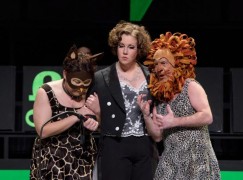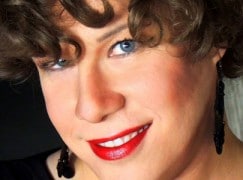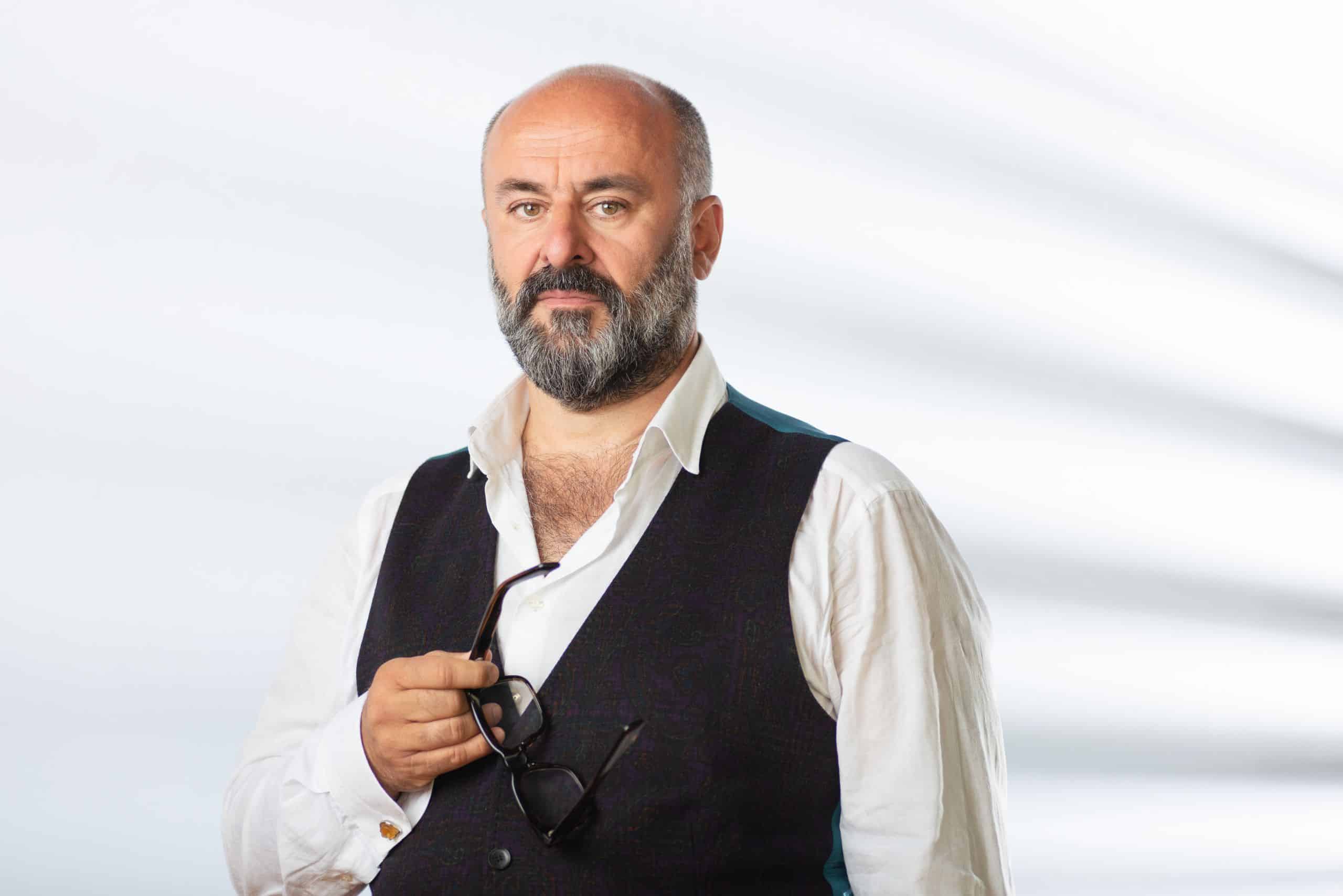Exclusive: My life as a transgender opera singer
mainLucia Lucas, a soloist in Karlsruhe (centre), is a trans woman who sings baritone roles.

Through her agent, Dominic Stafford Law, she has answered a few questions about her life and work.
WHAT IS GENDER DYSPHORIA?
Gender Dysphoria is the Clinical term, as of 2012, for the feeling that your brain does not match up with the characteristics of your Assigned at Birth Gender.
WHEN DID YOU KNOW?
I knew when I was about 5 or 6. I had no brothers or sisters to be put in one group for toys or clothes at home. My toys were not overtly masculine or feminine, usually being educational toys, including an erector set and lots of legos.
The integration of children at the beginning of a child’s education will quickly separate them into boys or girls, for various purposes. In this setting, a child does not self-identify, but is grouped with the same sex others were assigned at birth. With enough of this grouping, even an only child will realize what gender the world thinks they are. I was told I was not a girl, but I knew I was not a boy. At that age, short hair and no dress will exclude you from the girls’ playtime.
While I was growing up, I would save my allowance to buy girl things and hide them. These items would give me an inner calm. I was repeatedly coached on how to walk and talk from family and teachers from about 6-12. I think they wanted me to appear normal. I would do anything to simply wake up a girl. It was around the time of High School and puberty that I learned that other people were also experiencing what I was. Had someone of Caitlyn Jenner’s celebrity come out in the mid 80s, perhaps the climate would have shifted sooner.
WHEN AND WHY DID YOU COME OUT?
I had many attempts at coming out, starting before age 10.
I had been “caught” with girls clothing and makeup at various times in my childhood. In High School, I used Halloween to dress up as a girl. The calm I felt being around my peers as a girl made me know, in my heart, it was right. But in the late 90s, there were not other teenagers on youtube going through exactly what I was. I think for most trans kids, it’s easier to find info on your own in our current internet.
In college, around 2000, I gave very serious thought to transitioning. I even occasionally came to my music classes dressed up. I was scared to lose my support network, as I was living at my mom’s house in Sacramento while going to California State University, Sacramento.
Had I known that I would transition for sure, I would have got a degree in computer science. Transition is very difficult on an artist’s salary. So, I was getting better and better parts in the Operas at my school and my career started to really interest me. There was always a price tag in my brain for transitioning, and until I actually just did it, I thought the price was the end of my singing career.
Leaving for Chicago in 2005 was a huge commitment, so my brain was pre-occupied at least for a bit. I always thought I would go till I hit a wall in my career, then transition and give up music. I continued to get accepted into young artist programs, then eventually was given an apprenticeship at Deutsche Oper Berlin. Right when I kept getting ready to come out, my career would have something special happen, giving me a ‘sign’ that it was not the right time.
It was not until my third year at the Badisches Staatstheater Karlsruhe, that my Gender Dysphoria was unavoidable. Through grad school and my first three years of Germany, I moved an average of once a year. Moving is a stressful event and simply the logistics can keep your brain occupied. I think staying at one job and in one apartment for a while gave me calm to be with my own thoughts.
Around this time, the climate for trans people was already starting to shift. Every year the percentage of out trans people keeps growing. The fear of losing everyone becomes less and less the more people you see happy in their new gender. You see people coming out and you know that you are trans, you just keep weighing all you have to lose if you show the world who you are.
I went full-time the beginning of May 2014. I spoke with my wife Ariana at the end of October 2013, and we agreed this was something I had to officially talk with a doctor about.
I began talking to my doctor in November and planning for the journey. We found a psychologist and endocrinologist. A psychologist is needed to approve treatment after determining no underlying issues are present or, if present, are at least under control. If informed consent clinics existed in Germany to start hormones, I may have waited longer to officially come out, but I felt anxiety about moving farther away from my true body. It was clear than right now in Germany, I would have to commit to coming out to be able to actually start hormones.
My wife and I had an idea that we could go to the yearly Opera ball in Karlsruhe with her in a tux and me in an evening gown. This would give me an opportunity to see genuine reactions to people seeing me presenting female. Most people recognized my wife first, then figured it out. It was not a costume ball and my dress was a very nice dress purchased from Karstadt (like Macy’s). Some buzz started after the ball about how comfortable I looked and that maybe it wasn’t some dare or bet or joke.
Two days after Opernball, I came out to my Intendant, Peter Spuhler. I had one year in Heidelberg with him, and about 3 years in Karlsruhe at that time. I said that I have to come out. I love my job and I hope I can continue, but this was the most important thing to me. We talked first about my voice. Hormones cannot raise the pitch of a trans woman’s voice. I think many trans women would hope that it would raise their voices, including me, but sadly it does not. So the idea was born that maybe I could be a female baritone. Peter Spuhler has been extremely accepting and helpful in trying out this new idea of a woman baritone. There have been girls playing boys for hundreds of years in opera, but not as a baritone.
When I look in the mirror before my makeup is done, I see a woman. I see myself. I used to see an ageing, increasingly depressed and angry man. I was turning into all of my roles slowly in real life.
Kothner, Monterone, Bitterolf etc. were blueprints for my future. Now they are simply roles I play for the evening. I can actually enjoy playing a man onstage now that I don’t have to play one in real life.
I came out because I could not hide anymore and hiding my true self was exhausting and depressing.<
HOW DID YOUR FAMILY AND FRIENDS REACT?
My dad has not come to see me in Germany. He has not seen me in over 5 years, at least. I haven’t spoken with him on the phone for maybe 4 years. I would get the Happy Birthday, Merry Xmas and who died emails throughout each year. My body running on Estrogen has definitely reduced the wall that used to hold back my true feelings and inside thoughts. Last September, I just said that I didn’t want Birthday, Xmas etc. emails if that was all we were doing with this relationship. He wrote back that he was proud of all of the risks I have taken in my life and how they have went well. He said that I knew exactly who I was and that now some things when I was growing up made more sense. I am hopeful that more discussions will continue to take place.
My mother and I are close, but I still am not sure she understands what I’m going through. She works for the government and is surrounded by people who would likely react negatively to her talking about her new daughter. I think without being able to see her on a regular basis, understanding of my situation comes much slower for her.
My wife Ariana is amazing. We have been married for over 6 years and together for almost 12. She has been incredibly supportive at every step of the journey. Over the years, as much as I desperately wanted to be “normal”, it has become clear that this was very deeply part of my personality. She asked me one time early at Karlsruhe, “why are you so different at work than you are with me at home?” It was clear: I was holding back at work to keep up my “normal” vibe.
My friends that I work with have been great, as are most of my old friends that only exist now on Facebook. I have had a couple of friends that don’t agree or understand, but ever since I left the US, most people only exist on Facebook. There is not time or money to visit my friends scattered about the world. I share pics of my evolving face and pictures of crazy costumes I get to wear. People are never negative and generally are very supportive.
I have step and half siblings, but really didn’t get to spend much time growing up with them. They are generally supportive and I think if I lived in Sacramento, we would see each other regularly.
HOW DID YOUR PROFESSIONAL CONTACTS REACT? (HOUSE, AGENT, COACH, COLLEAGUES)
My Intendant, Peter Spuhler, was the first non-family person I told, besides two very good friends in Karlsruhe. He was basically the Keystone to this entire project of a female baritone.
My job continued until the fall, when I was renewed. Each October most of the ensemble will find out if they are renewed for the season after. At the end of October I knew I would have work until at least September 2016. This is incredible job security for any field, not to mention the arts. <
When I came out he said, “but you play a man on stage so well!?” I replied, “I have been learning that skill my entire life.” I think he watches with cautious optimism how well I do with this transition, but he is absolutely supportive. I cannot thank him enough for this. I have a full-time job during the majority of my transition and could not be more thankful. Many, if not most, trans people do not have that luxury.
My Agent, Dominic Stafford Uglow has been amazing. I am sure he did not see this one coming. I was prepared to have to start over with a new agency, but he has turned out to be one of my greatest career defenders. He has read at least as many articles about trans people as I have and was very quick to incorporate politically correct and preferred vocabulary. He was very quick to adopt my name and pronouns. He has single-handedly taken houses from thinking this will never work, to giving me auditions.
My coaches are all fantastic. They had no problems switching right over with everything. I think it may have taken a little time getting used to my voice coming out of a different presentation, but they didn’t show it.
My GMD Justin Brown was very supportive and, when I came out, said his first boss was actually a trans man, back in the early 80s. Most of the rest of the staff have been great.
There have been scary moments. I told a conductor in private after a rehearsal that I know it takes a while, but I would appreciate if he could use female pronouns when I wasn’t on stage. He laughed at me, turned and walked away. I was warned by the Operndirektor that if the stage directors didn’t want to use me that I may find myself with no work here. I think my ongoing blog series “An engineer’s guide to opera” and my willingness to present the gender a director needs in rehearsal should show that this is not an issue.
Colleague reactions have generally been good. I do think that this puts a magnifying glass on what I do, but I think I am up for the challenge. I always wanted to be the most prepared person in the room and this has not changed.
HOW DOES THIS CHANGE WHAT YOU ARE PERFORMING?
I am performing all of the same things. Still singing angry old men on stage, but fringe projects have also started appearing as possibilities. I had the pleasure of presenting the High Priestess in Samson et Dalila with Staatstheater Darmstadt.
I must especially thank Charlie Edwards, Karsten Wiegand, Berthold Schneider and Inga Levant for this opportunity. They all gave me the freedom to explore another dimension of this character. This is normally a very misogynistic character, but by changing the inflection without changing the text we were able to achieve an interesting spin. I would be very excited to play with gender in traditional operas more in the future. 90% of my projects remain playing cis-gender male roles and I am perfectly happy with that.
I think the repertoire of masculine conscious mannerism I have learned from the age of 6 would rival almost any actor. As a child I had to hide my feminine expression and I have built up quite a repertoire of how to be masculine.
HOW DOES THIS CHANGE HOW YOU ARE PERCEIVED?<
I think most people are OK in theory with trans people, but may also be the first to say, “I told you it wouldn’t work.” Before I came out, no one questioned my technique or my acting or my marriage. Some critics and some colleagues feel very free to say they think hormones are affecting my voice. I record samples constantly and post new ones every 2-3 months and have many ears I trust. My voice has not changed. As for acting, I was told that I couldn’t put my hand in front of my mouth when I was surprised for a character because that was a feminine gesture. It was for a comic figure and I am pretty sure I did it the same way the last time I did it. This was before I came out and no one ever said anything.

WHAT DOES THE FUTURE HOLD?
I plan to conquer the Baritone world. I want to sing all the most masculine roles and continue to be myself offstage. I want to have the best product and give the most conservative houses in the world no choice but to hire me. I want my work to continue to stand up to a blind taste test. I don’t want my gender to hold me back and I don’t need it to help me. I have sung in some very important places before I came out and I plan to grow my career even more
People who are in a field very constrained to traditional gender roles will have to commit to their transition and risk their careers. They will have to put the initial transition in the hands of others and hope their job continues. For people lucky enough to have HR departments to help them transition, congratulations.
If there is a music student who is trans, but has not come out yet, opera is a difficult field to break into and possibly impossible if you are openly trans. I had five years of singing full-time in Germany before I came out. For an instrumentalist, I think it is not such a big deal. I think the performers in Opera are people who would be accepting, but the Business itself likes traditional people.
In about 2002, I looked for a job selling pianos. The manager said that he liked me, but informed me that the customers were very traditional and I would sell more pianos if my hair was clean cut. My hair was one of the things that calmed me and I loved having it to my shoulders after my parents couldn’t make me cut it anymore. So… I cut it and came back the next day. He hired me shortly after.
I will never again give up my identity to fit in someone else’s box. If my identity stops me from having the career I want, then that’s not the career I want anyway.
(c) Lucia Lucas/Slipped Disc





I love this article!! Thank you for making such a great interview, Norman. This might be helpful to a lot of people in the same situation as she was/is.
Justin Brown was referring to Hazel Vivian/Vic Morris if anyone was wondering.
All I can say is that I am very impressed. As of earlier this year I now know of three trans women composers (myself + 2 others), a trans concert pianist and a trans French horn player (this person is the only female to male that I know). I hope to meet all of these people plus Lucia some day.
I admire transpeople (and crossdressers) for their bravery in publicly expressing their true identities despite the narrow-mindedness and other negative responses they can encounter.
And may I say that Lucia is a beautiful woman.
Comparing Karstadt to Macy’s? Really?
One of your finest columns ever. Makes me want to hear this voice as she sounds so confidant about ‘the product’! Lovely. Thank you.